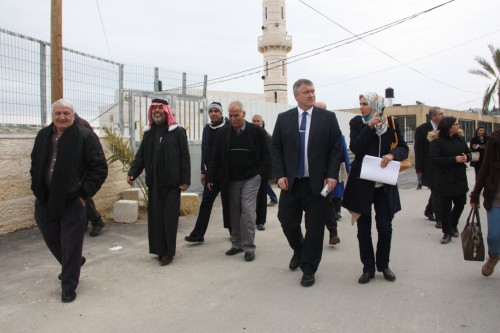8th June 2015 Jerusalem, Israel
Let us look for hope after 48 years…
Forty-eight years ago this week, the Middle East was engulfed in war. This war, known as the 1967 war or the Six Day War, changed the shape of the region. And it dramatically changed the lives of many living here. I have met Palestinians in the cities and refugee camps of the region and have heard many stories of what is known amongst Palestinians as the “Naksa”: of lives uprooted and homes lost.
I will leave analysis of what happened in 1967 to the historians. But the fact is that it shaped the reality of what I deal with today as a diplomat working in Jerusalem: the occupation of the West Bank, East Jerusalem and Gaza; the wave of settlement building which began in 1967; the millions of Palestinian refugees here and across the region.
From my travels around the West Bank, Gaza and East Jerusalem I know that life is still desperately hard for Palestinians today, forty-eight years later. According to the UN, more Palestinians were killed by Israeli forces in 2014 than in any year since 1967, especially during the Gaza conflict. In 2014, NGO figures show that construction began on 40% more new settlement structures than in 2013. The young people I meet in refugee camps lack hope for their future.
In spite of all this, the UK, with many of our international partners, continues to maintain hope in a two-state solution. We want to see a viable and sovereign Palestinian state living alongside Israel, with an end to the Occupation. We believe this state should be based on the 1967 borders with agreed land swaps. We want to see Jerusalem as the shared capital of both states. And we want a just, fair and agreed settlement for refugees. We believe a resolution of the Israeli-Palestinian conflict is necessary to achieve wider peace in the Middle East.
These are not just empty words.
We are working to preserve the vision of a Palestinian state based on the 1967 borders. The UK is providing support to Palestinian community organisations to contest home demolitions and relocation of vulnerable communities, such as the Bedouin. We are supporting Palestinian organisations developing master plans for Area C and East Jerusalem to enable development. We are clear and consistent in our opposition to settlement building which we consider illegal under international law and a threat to the two state solution. We work to stand up for Palestinians’ rights under international law.

We are working to preserve the Palestinian character of East Jerusalem, and safeguard Jerusalem’s future as a shared capital. We support NGOs helping Palestinians maintain their residency in Jerusalem. We support fantastic community organisations serving the community, giving young people the opportunity to play football in Issawiya and the Old City, or learn traditional craft activities in Silwan. We push for the reopening of institutions in Jerusalem representing the Palestinian community.
We are supporting Palestinian refugees in the OPTs and in the region. We are providing £30m to UNRWA this year. We provided a further £9m in support to refugees in Gaza following last summer’s conflict and we are providing £8m to help vulnerable Palestinian refugees affected by the Syria crisis. This support aims to assist refugee families and protect their rights until a just and fair solution is agreed.
And finally, we are working with Palestinians to build a Palestinian State and boost economic growth. We help the Palestinian Authority to pay the wages of employees working in health and education. We are working with the authorities to improve financial and governance systems. We work with NGOs to ensure that the authorities are held accountable by citizens. We provide training to the Palestinian security forces. We support the private sector to create jobs and help businesses in Gaza get back on their feet.
Most importantly, we want to see the Palestinian Authority in control of and serving Gaza too. Gazans must be at the heart of any future Palestinian state. The Palestinian Authority and leadership must represent all Palestinians. We are working to ease movement and access restrictions, supporting vulnerable communities in Gaza and facilitating reconstruction and economic growth.
We hope this work will assist in transforming the two state solution from a theory into a living reality for the generations to come. 48 years on from the 1967 war, I know this vision seems like a distant dream for many Palestinians. There have been missed opportunities on both sides during the different rounds of peace process negotiations. But we believe this is still a vision worth working towards. A peaceful resolution of the conflict and the establishment of a sovereign Palestinian state living side by side with Israel would have a huge impact on the Middle East and provide fertile soil for peace efforts elsewhere in the region.